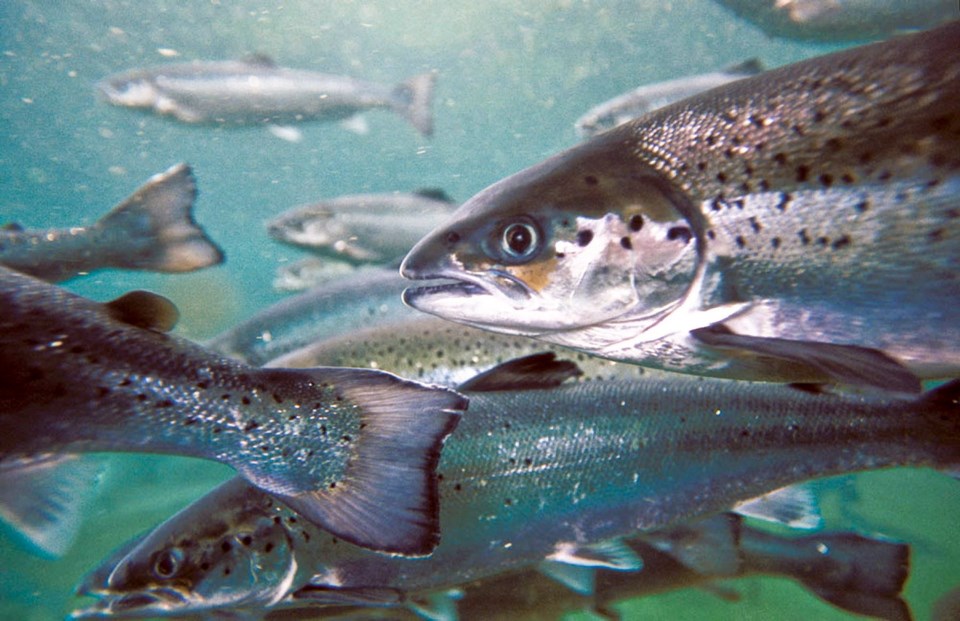The First Nations Wild Salmon Alliance is calling on the federal government to stop expansion of fish farming and include First Nations in its efforts to protect wild salmon.
Open-net pen farming threatens the health of wild salmon stocks, chairman Bob Chamberlin said, and many farms were established without adequately consulting First Nations.
“We have about one third of the total [fish-farming] industry in our territories and it’s really troubling,” said Chamberlin, who is also chief councillor of the Kwikwasutinuxw Haxwa'mis First Nation.
Some were established decades ago without the chief’s consent, he said.
“That’s been the long, sad history of the industry in our territory — a complete and utter disregard for First Nation title and rights,” he said.
Chamberlin is writing to federal Fisheries Minister Dominic LeBlanc, requesting a meeting next month. He wants Cohen Commission principles to be implemented and the government to support a move toward land-based, closed-containment aquaculture.
The Cohen Commission into the decline of Fraser River sockeye, tabled in 2012, made 73 recommendations to protect wild salmon, including shutting down farms in the Discovery Islands that pose risks to wild stocks.
Closed-containment aquaculture prevents the chance of escaped fish and salmon-lice infestations from spreading to wild stocks.
“Wild salmon is the main source of protein for First Nations across B.C. It feeds into our traditions and cultures … so it’s a keystone resource for us,” Chamberlin said.
A University of Toronto study released last week found an epidemic of sea lice in 2015 throughout salmon farms in the Queen Charlotte Strait.
Sea lice spread to migrating juvenile wild salmon, resulting in the highest number of sea lice observed on wild salmon in a decade, the study said. Scientists observed sea lice on more than 70 per cent of fish sampled in the Broughton Archipelago.
Chamberlin is one of many voices calling for changes to the fish-farming industry. Among them is biologist Alexandra Morton, who is visiting fish farms along the Fraser River sockeye migration routes from Vancouver to the north end of Vancouver Island.
In partnership with the Sea Shepherd Conservation Society, Morton is testing for disease in what is described as a “non-aggressive” manner, as well as checking other wildlife near aquaculture operations, searching for toxic algae blooms and looking at the waste that flows out of the marine net pens.
On May 6, 2015, the Federal Court of Canada sided with Morton and struck down aquaculture-licence conditions that allowed private companies to transfer fish infected with viruses to open-pen farms in the ocean without ministerial permission.
But at least one First Nation has said the Sea Shepherd Conservation Society is not welcome to visit two small Atlantic salmon farms on the Campbell River nation’s territory. Tlowitsis Chief John Smith said fish farming is becoming a cornerstone of the nation’s economy.
Jeremy Dunn, executive director of the B.C. Salmon Farmers Association, said the industry’s track record speaks for itself.
“Salmon on farms are very healthy, with about 90 per cent surviving through to harvest. And every farm in B.C. has at least one audited third-party certification to back up their sustainability claims,” he said.
Seventy-eight per cent of salmon is raised in B.C. under a First Nations agreement, involving economic and social benefits for host communities.
The Kwikwasutinuxw Haxwa'mis First Nation is one of the few communities that doesn’t have an agreement, he said.
“Salmon farmers have reached out to Mr. Chamberlin’s band many times to try and establish a partnership, and have not been met with a willing partner,” Dunn said.
In 2013, 17,300 tonnes of wild salmon and 81,500 tonnes of farmed salmon were harvested in B.C. Farmed salmon was B.C.’s top seafood commodity, accounting for $475.8 million, almost 59 per cent of total seafood revenues and 95 per cent of salmon revenues, according to the province.



